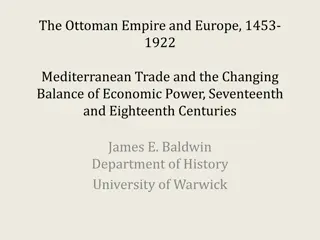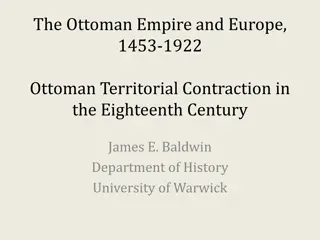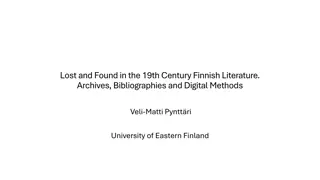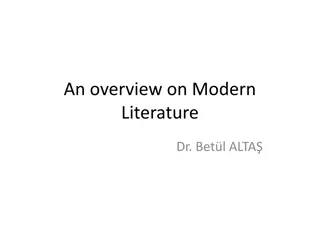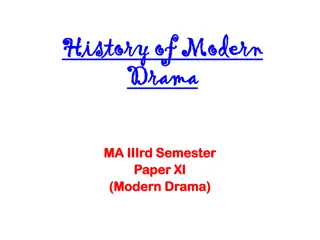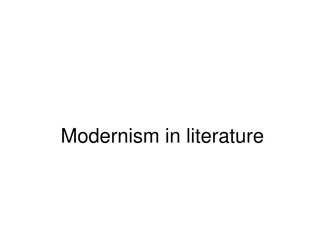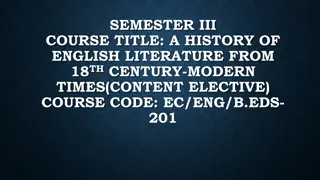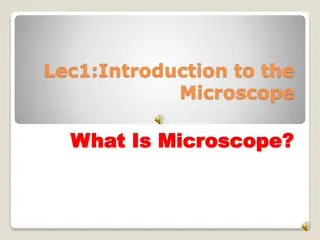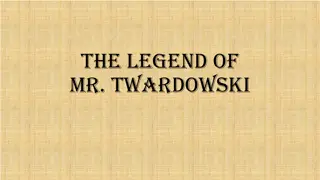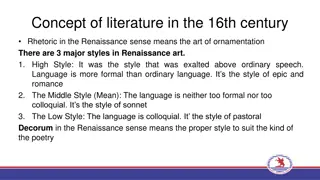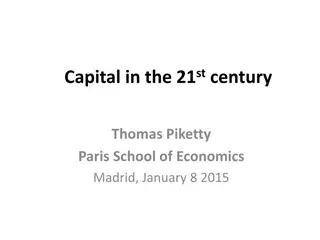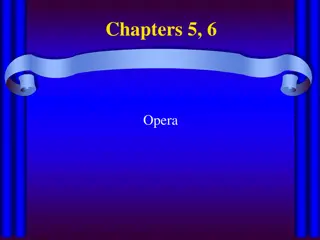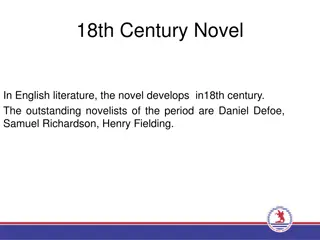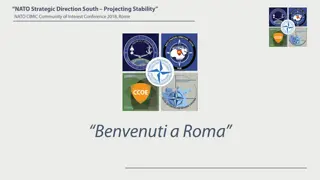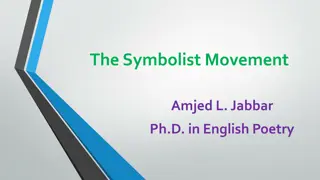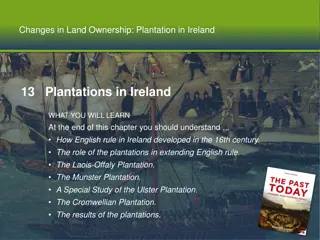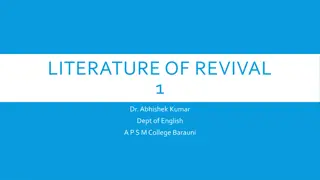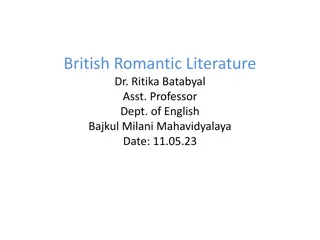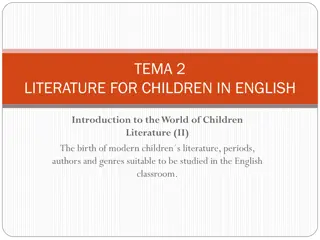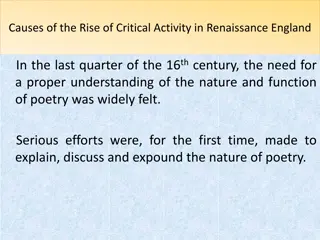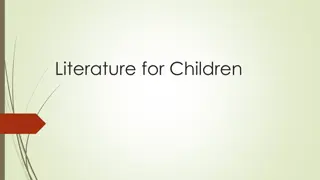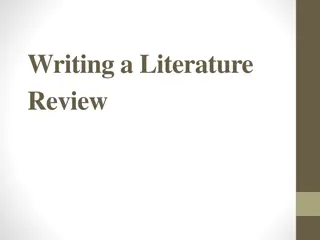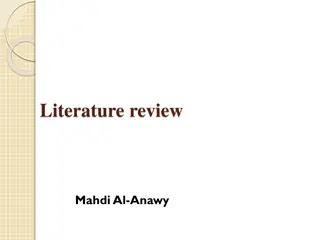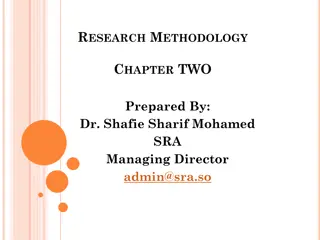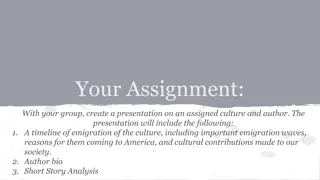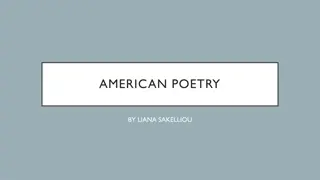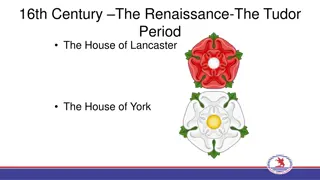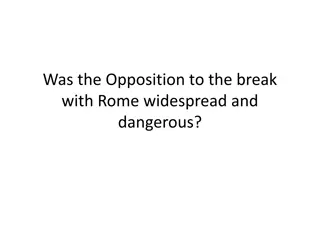Ottoman-European Economic Relations and Mercantilism in the 16th Century
The Ottoman Empire and Europe traded various goods in the 16th century, with a negative trade balance favoring the Ottomans. Institutional innovations like the Joint-Stock Company and the Levant Company emerged to facilitate trade and secure better terms. Mercantilist policies were implemented to re
2 views • 15 slides
Ottoman Empire Territorial Contraction in the 18th Century
Ottoman Empire faced agricultural and fiscal crises in the 17th century, leading to internal rebellions. However, by the mid-17th century, the empire had recovered and experienced further expansion, albeit at a slower rate compared to the previous century. In the 18th century, the Ottomans suffered
2 views • 12 slides
Lost and Found: 19th Century Finnish Literature Exploration
Exploring the 19th-century Finnish literature through archives, bibliographies, and digital methods. Efforts to improve metadata, discover new knowledge about authors and works, and reconstruct the literary system disrupted by historical events like the Great Fire of Turku.
1 views • 12 slides
Evolution of Modern Literature in the 20th Century
The Modern Age in literature emerged in response to the Victorian era, marked by a shift in attitudes towards life and society. Influenced by historical, economic, and ideological factors such as World Wars, capitalism, and the disintegration of empires, Modern Literature explored new themes and sty
1 views • 14 slides
Evolution of Modern Drama in English Literature: A Comprehensive Overview
Modern drama in English literature evolved through different phases from the late 19th to the mid-20th century, showcasing innovative techniques and themes. The revival of drama in the 20th century brought forth various trends and currents, reflecting social issues and nationalistic sentiments. This
0 views • 7 slides
Modernism in Literature and Beyond
Modernism in literature emerged as a groundbreaking international movement in the early 20th century, challenging traditional norms and exploring new forms of expression. This movement, characterized by experimentation and a rejection of absolute knowledge, extended beyond literature into various fi
2 views • 17 slides
Effective Strategies for Literature Searches and Re-Use of Scholarly Literature
Conducting literature searches involves surveying existing publications and information on a specific topic. Different search strategies, from simple searches to systematic queries and snowballing, are utilized based on research needs. Learning objectives include building search strategies, using ad
4 views • 19 slides
Introduction to Isixhosa Language and Literature - Exploring Characters and Themes
This content provides an overview of Isixhosa as a first additional language (FAL) and delves into key aspects of literature such as character development and themes. It discusses the importance of characters in storytelling, emphasizing the significance of round and flat characters. The article als
4 views • 28 slides
English Literature from the 18th Century to Modern Times
This course focuses on major literary movements from the 18th century to modern times, examining the history of modern literature and exploring overlapping trends and traditions. Students will critically analyze historical texts, write organized critical essays, understand word structures, and grasp
1 views • 9 slides
Evolution of Microscopes: From Reading Stones to Phase-Contrast Microscopy
The history of microscopes dates back to the 11th century with the invention of the reading stone, leading to the creation of wearable eyeglasses in the 13th century. The first microscope was developed in the late 16th century by Zacharias Jansen, paving the way for the compound microscope and the t
0 views • 17 slides
The Legend of Mr. Twardowski: A 16th-Century Nobleman and His Encounter with the Devil
Legend tells the story of Jan Twardowski, a 16th-century nobleman in Cracow who delved into magic and alchemy. After summoning the devil and making a pact, Twardowski used his newfound magic to heal people but faced a battle for his soul. Ultimately, he was saved by his prayers and now resides on th
1 views • 6 slides
Literature in the 16th Century: Styles, Patronage, and Poetry Traditions
Explore the concept of literature in the 16th century, focusing on rhetoric in the Renaissance, major styles in art, the role of courtiers and patrons, poetic traditions like heroic, Ovidian, pastoral, and sonnet, and delve into the analysis of Sir Thomas Wyatt the Elder's poem "The Long Love that i
0 views • 4 slides
Comprehensive Literature Review Guidelines for Your Dissertation
Discover expert guidelines for conducting a thorough literature review in your dissertation. Explore topics such as literature search strategies, theoretical frameworks, review of the literature, synthesis, and analysis, with actionable tips provided throughout.
0 views • 11 slides
Exploration of 17th Century Literature: Themes, Poets, and Poetry Schools
The literature of the 17th century in London is characterized by melancholic themes, centered around notable figures like John Milton. The era saw the rise of two distinct schools of poetry - metaphysical and cavalier poetry. Metaphysical poets like John Donne employed unconventional metaphors and e
0 views • 5 slides
Exploring the Significance of Persian Language and Literature in Indian History
Persian language and literature hold a crucial place in Indian history, serving as a prime source for understanding the medieval period. Scholars in India have dedicated their lives to preserving and promoting Persian history, language, and literature. The rich cultural heritage of India, dating bac
0 views • 9 slides
Mastering the Literature Review Process
Understanding the significance of literature review, this guide emphasizes the essential steps involved in conducting a successful literature review - from planning and research problem identification to critical analysis and contribution to existing literature. It explains the importance of develop
0 views • 16 slides
GCSE English Literature Exam Overview
This GCSE English Literature exam overview provides details on the components, assessment objectives, text choices, and key information for students. It covers Shakespeare, Poetry, Post-1914 Prose/Drama, 19th Century Prose, and Unseen Poetry. Students will engage with a variety of texts ranging from
5 views • 23 slides
Effective Strategies for Conducting Business Research Literature Review
This literature review provides insights into conducting business research effectively, covering topics such as how to search, read, and write literature reviews, along with the goals and types of literature. It emphasizes the importance of generating research ideas, demonstrating knowledge, and int
1 views • 13 slides
Evolving Perspectives on Literature and Translation
Explore the intertwined relationship between national literature, comparative literature, and world literature, delving into the evolution of translation studies. Reflect on the shift from national literary histories to world histories of literature, highlighting the significance of world literature
4 views • 54 slides
Global Analysis of Income and Wealth Inequality Trends Since the 18th Century
Presentation based on "Capital in the 21st Century" by Thomas Piketty, exploring income and wealth distribution dynamics from the 18th century across 20+ countries. The focus is on shifting from rising income inequality to rising wealth inequality, analyzing the long-term evolution of capital/income
0 views • 54 slides
Evolution of Opera: From Italian Camerata to Monteverdi and Purcell
Opera originated in late 16th century Italy, influenced by Greek tragedies and quickly gained popularity among aristocracy and general public by the mid-17th century. Baroque culture combined elements of literature, visual art, and music to create opera. The text in opera is vital for storytelling,
1 views • 14 slides
English Literature Course: Analysis of Novels and Short Stories
Explore the world of English literature through an in-depth study of novels and short stories in this course outline for the 2021-2022 academic year at Ondokuz Mayıs University. Delve into the development of the novel in England, from the 18th century to modernism, and analyze key works by renowned
1 views • 4 slides
Evolution of the 18th Century English Novel
The 18th century marked a significant evolution in English literature, particularly seen in the development of the novel. Key novelists of this period include Daniel Defoe, Samuel Richardson, and Henry Fielding. Their works, such as Robinson Crusoe, Pamela, and Tom Jones, epitomize the various style
0 views • 11 slides
NDC Conference Agenda: 14th-16th May
Detailed agenda for the NDC conference from 14th to 16th May includes key speeches, syndicate work sessions, coffee breaks, and networking events. The event spans across three days with a mix of presentations, group activities, and wrap-up sessions, offering a comprehensive program for attendees.
0 views • 5 slides
The Symbolist Movement in Literature
The Symbolist Movement in literature emerged in France in the 1850s, lasting till 1900, influencing 20th-century arts and bridging Realism to Modernism. Symbolists aimed to convey personal, dream-like states with metaphorical language, challenging positivism and realism. Stylistically, they emphasiz
0 views • 16 slides
Plantations in Ireland: Development of English Rule in the 16th Century
Dive into the historical significance of plantations in Ireland during the 16th century, understanding how English rule evolved, the various plantations established like Laois-Offaly and Munster, the impact of Tudor efforts to conquer Ireland, and the reasons behind the failure of certain plantation
0 views • 25 slides
Literature of Revival in the 15th Century: A Historical Overview
The 15th century marked a significant phase in the history of literature, where the revival brought about political and religious changes. This era witnessed the rise of great works such as Thomas More's "Utopia," Erasmus's "Praise of Folly," and Tyndale's New Testament. These works, written in Lati
0 views • 5 slides
The Status of Literature in Secondary Schools of the O.E.C.S. - Research Findings by Dr. Anthony Felicien
Research by Dr. Anthony Felicien examines the status of literature in secondary schools of the O.E.C.S., focusing on the decline of interest in literature among students, influenced by historical curriculum changes and parental attitudes. The study highlights the importance of studying literature fo
0 views • 35 slides
Exploration of British Romantic Literature through the Works of Samuel Taylor Coleridge
British Romantic Literature underwent a significant shift from the strict rationality of the 18th century to embracing imagination, nature, and emotion in the 19th century. This shift is exemplified through the works of Samuel Taylor Coleridge, particularly his unfinished epic poem "Christabel." The
0 views • 5 slides
Evolution of Children's Literature in English: From Alice to Modern Times
Explore the birth of modern children's literature starting with the publication of "Alice's Adventures in Wonderland" in 1865 by Charles Dodgson (Lewis Carrol), marking a shift towards entertaining and engaging literature specifically for children. Prior to this, children mainly read folklore and ad
0 views • 35 slides
Causes of the Rise of Critical Activity in Renaissance England
In the last quarter of the 16th century, Renaissance England saw a surge in critical activity surrounding poetry. This was spurred by factors such as the medieval view of poetry, the appreciation of poetry in courtly circles, influence from the rediscovery of Aristotle's Poetics, and challenges pose
0 views • 6 slides
Evolution of Children's Literature: From Past to Present
Explore the rich history and development of children's literature, from its early beginnings in the 17th century with Johann Amos Comenius to the diverse genres and notable works in the 19th century. Discover how the 20th and 21st centuries ushered in a new era with prestigious awards like the Newbe
0 views • 8 slides
Mastering the Art of Writing Literature Reviews
Understanding the essence of a literature review, its descriptive and analytical components, selecting key articles, and finding relevant sources are essential steps in crafting a comprehensive literature review. By integrating ideas from various sources and highlighting crucial findings, a literatu
0 views • 18 slides
Comprehensive Guide to Literature Review Process
A literature review is essential before conducting research to identify existing information, gaps in literature, major works, and relationships between studies and theories. Follow steps such as defining the topic, sourcing information, discussing findings, and drafting to write an effective litera
0 views • 8 slides
Effective Strategies for Conducting a Literature Review in Research Methodology
Understanding the importance of literature review in research methodology, this chapter discusses the objectives, aims, and guidelines for writing a comprehensive literature review. It emphasizes the significance of identifying gaps in existing knowledge, structuring the review, and organizing infor
0 views • 33 slides
Study English Programme at UL: Literature, Analysis, and Context
The English program at UL fosters critical and analytical skills through literature appreciation and exploration of social, cultural, and historical contexts. Students delve into literary analysis from the 16th century to modern times, with elective choices for personal interests. The curriculum cov
0 views • 5 slides
Hispanic Immigration Timeline & Sandra Cisneros Influence
Explore the timeline of Hispanic immigration to America from the 16th century to the mid-20th century, highlighting significant events such as the Treaty of Guadalupe Hidalgo and the Bracero Program. Learn about the cultural contributions of Hispanics and delve into the author Sandra Cisneros and he
0 views • 18 slides
American Literature Through the Ages
Explore the rich tapestry of American literature covering American Indian culture, New England Puritanism, the 18th century American Enlightenment, and the American Renaissance. Discover the oral traditions of American Indian tribes, the puritanical values of New England, the democratic origins of A
0 views • 17 slides
The Tudor Period: 16th Century Renaissance in England
In the 16th century, the Tudor period in England marked the end of the Wars of the Roses between the Houses of Lancaster and York. Henry VII became the first Tudor king after defeating Richard III. Subsequent rulers like Henry VIII and Elizabeth I influenced the country's political and religious lan
0 views • 14 slides
Opposition to the Break with Rome in 16th Century England
The opposition to the break with Rome during the reign of Henry VIII in 16th century England was notable, leading to executions of prominent figures like Sir Thomas More and Bishop John Fisher. Despite some limitation of overt opposition, the English people were deeply connected to the papacy. The s
0 views • 12 slides
